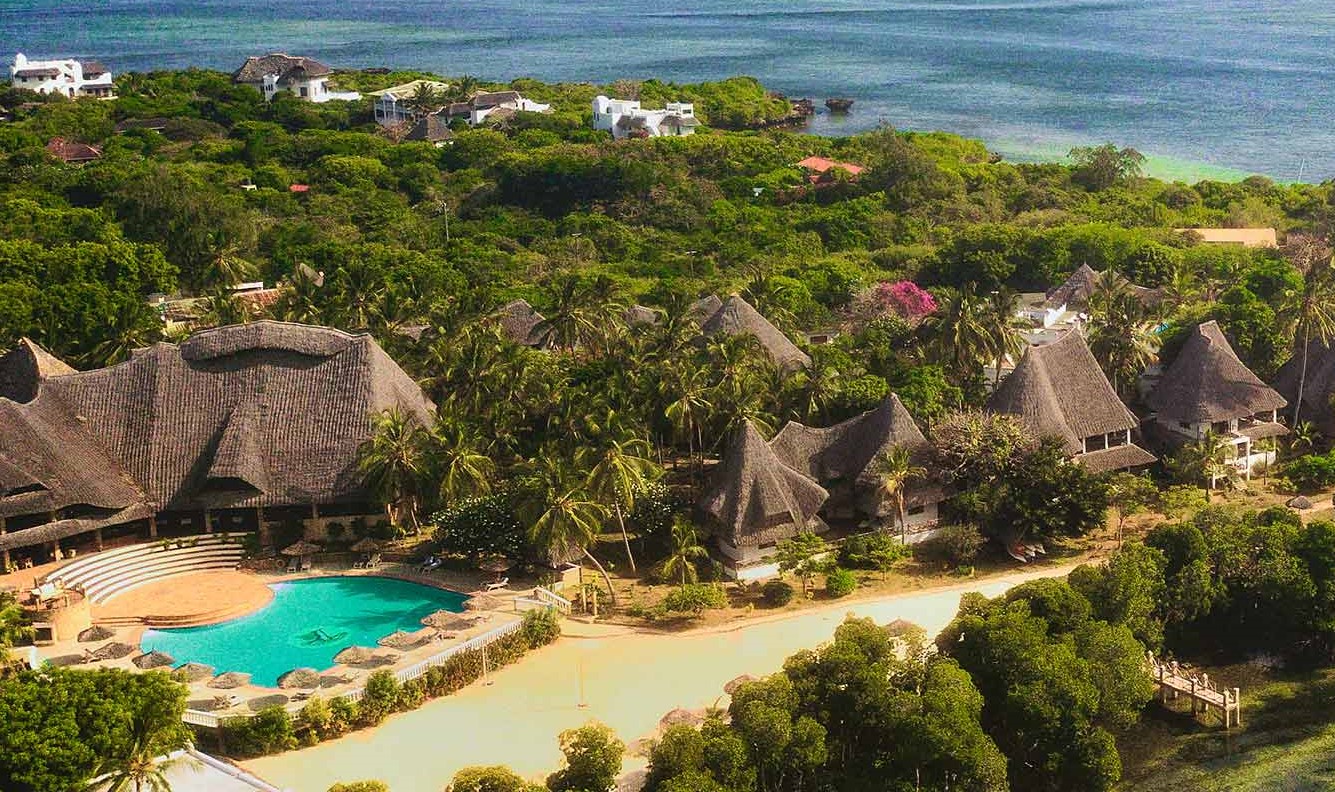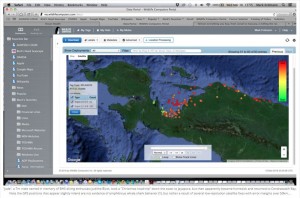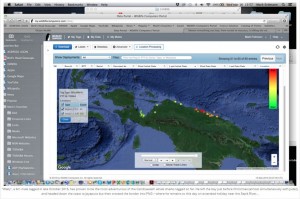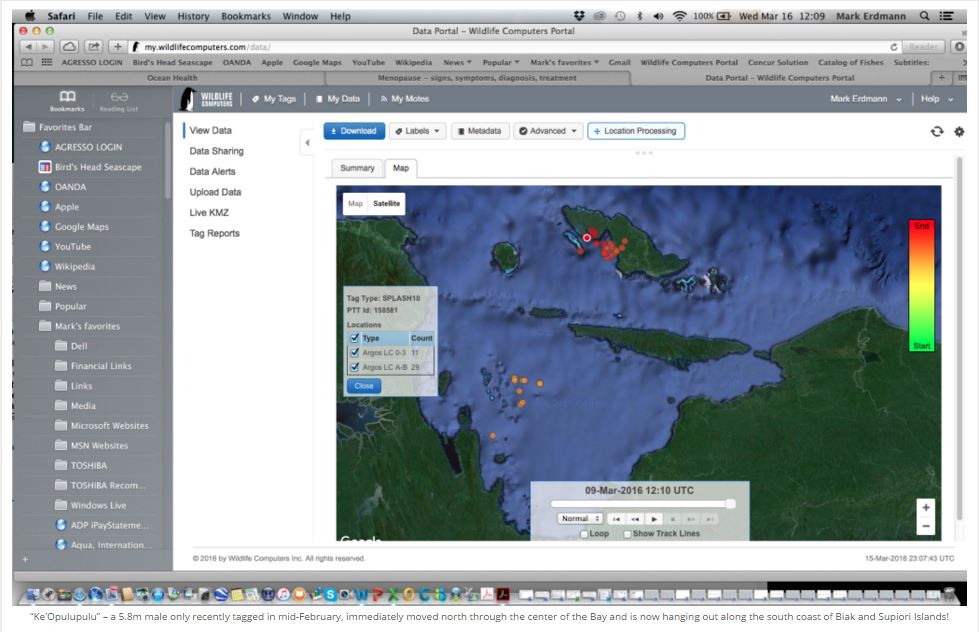News
Cendrawasih’s whale sharks…. not such homebodies after all

For the past five years, Cendrawasih Bay’s friendly whale shark population has been attracting a lot of attention, primarily because of the near-certainty of having outstanding (and lengthy!) whale shark encounters during a visit to the region. Unlike many of the other known whale shark aggregations in the world (such as Ningaloo, Isla Mujeres, Belize, Galapagos and Donsol), which are highly seasonal, we now know with certainty that Cendrawasih has whale sharks present in the bay year round. Indeed, based on our observations combined with photos submitted by visitors to our BHS whale shark database, some highly-recognizeable individuals seem to be present throughout the year. Of course, one of the surest ways to confirm this is to monitor individual animals’ movements through satellite tagging – which is exactly what we’ve been doing in collaboration with the Cendrawasih Bay National Park Authority and Pak Bram Maruanaya and his local Kalilemon homestay in Kwatisore.
 Since June 2015, we’ve been able to tag 15 male whale sharks (ranging in size from 3 to 7 m in length) from Cendrawasih, using custom-made fin-mounted satellite tags by Wildlife Computers. These fin-mount tags have extended battery life which we hope will provide data for up to two years, and we’ve been delighted with their performance to date. All but one of the tags has been transmitting data very regularly (on average every 2-5 days) – basically each time one of the tagged sharks spends enough time on the surface for the tag to uplink to the ARGOS satellite network.
Since June 2015, we’ve been able to tag 15 male whale sharks (ranging in size from 3 to 7 m in length) from Cendrawasih, using custom-made fin-mounted satellite tags by Wildlife Computers. These fin-mount tags have extended battery life which we hope will provide data for up to two years, and we’ve been delighted with their performance to date. All but one of the tags has been transmitting data very regularly (on average every 2-5 days) – basically each time one of the tagged sharks spends enough time on the surface for the tag to uplink to the ARGOS satellite network.
As previously reported back in November, the initial data received from June through October 2015 seemed to confirm what many suspected – that Cendrawasih whale sharks are largely “homebodies”, preferring to stay close to shore and feed upon the abundant ikan puri baitfish schools that abound in the coastal bays and estuarine areas of the southern and eastern coastlines of Cendrawasih. Which of course is a great thing for BHS marine tourism, as it means visitors can pretty much plan a trip any time of the year and have a very good chance of excellent whale shark interactions.
By December, however, we started to observe some very different behaviours that indicate Cendrawasih’s whale sharks might not be such homebodies after all! Just before Christmas, four of the sharks almost simultaneously moved towards the small exit to the bay between the eastern tip of Yapen Island and the Papuan mainland. Though two soon turned back, both “Jude” and “Wally” proceeded down the coastline towards Jayapura. Jude eventually turned back and returned to Kwatisore, but Wally continued down the coast – becoming the first of our tagged sharks to become an international visitor when he crossed into PNG waters in early January. While he appeared at one point to be returning to Cendrawasih (making it as far west as Jayapura), he’s since returned to the Wewak region of PNG (near the Sepik River outlet) and seems to be happily enjoying an extended vacation there!
Similarly, one of our most recently tagged whale sharks, Ke’Opulupulu, headed almost immediately north into the center of the Bay (near the Auri Islands and atolls), then navigated to the south coast of Biak and Supiori Islands, where he’s remained for the past few weeks.
But horizontal movements are only part of the excitement we’ve recently recorded. The past 3 months have also seen a dramatic increase in deep-diving behaviour of many of our tagged sharks. While we did previously report a 672m deep diving record in October, we’ve now seen four of our sharks venture below 1000m depth, with the aptly-named “Moby” smashing the depth record (but fortunately not his tag’s depth gauge!) at 1416m!!! Even the “wee” 3m “Fijubeca” has dived to 700m depth. It’s still not clear why the sharks have shown such deep diving behaviour over the past few months – perhaps the El-Nino warmed surface waters are not providing enough food and they are searching for deeper plankton…
Overall, we’re delighted to see these fin-mount tags proving so successful at divulging some of the secrets of Cendrawasih’s whale sharks. Its particularly noteworthy that the first 5 months’ of data seemed to simply confirm our scattered direct observations, but the past 4 months have revealed numerous exciting behaviours we didn’t expect. Who knows what the next few months’ data might reveal? Stay tuned and we’ll happily report back as the data keeps flowing in. And please remember – you too can contribute to our expanding knowledge and understanding of the charismatic megafauna of the Bird’s Head by contributing your photo IDs and observations of whale sharks and manta rays in the region to the databases maintained by our site.
Mark Erdmann is Conservation International’s Vice President of Asia Pacific Marine Programs. Though now based in New Zealand after 23 years in Indonesia, he is still intimately involved with the Bird’s Head Seascape and frequently disappears into its remote corners for weeks on end….
Shawn Heinrichs is an Emmy Award-winning cinematographer, photographer and marine conservationist. An independent filmmaker, he is the founder of Blue Sphere Media, a production company specializing in underwater, adventure and conservation media. His work was recently featured in the film Racing Extinction.
A special thanks to Audrey, Shannon and Dennis Wong, Sally Timpson, and the management and guests of the True North expedition vessel for generously sponsoring the fin-mount whale shark satellite tags reported here, to Patti Seery and her amazing staff and crew of the Si Datu Buah liveaboard for hosting our most recent deployment expedition, and to OceanMax for continuing to support the tagging program with PropSpeed silicone foul-release coating for our satellite tags.
Marine Life & Conservation
Steve Backshall to headline Shark Trust’s flagship event: For the Love of Sharks

Join a host of amazing, shark loving, speakers including Steve Backshall and the Shark Trust team for an evening celebrating shark conservation at the Royal Geographical Society in London this November.
Date: 29th November 2024
Time: 6-10pm
Location: Royal Geographical Society, London
Tickets: https://www.sharktrust.org/Event/flos24
The event will be a celebration of all things shark. Those lucky enough to get hold of tickets will hear from engaging guest speakers with a passion for sharks.
The line-up includes (*subject to change if unforeseen circumstances arise)
Steve Backshall: One of television’s busiest presenters, BAFTA award-winning wildlife expert Steve has been passionate about the wild world ever since he was young.
Steve’s impressive TV career has taken him all around the world, investigating a wide array of species and environments. Steve has filmed over 100 hours of children’s wildlife programmes with the BAFTA award winning Deadly 60 franchise and recently, with Sky Nature, for his new series ‘Whale with Steve Backshall’. He has been a patron for the Shark Trust for 10 years.
Simon Rogerson: is a photojournalist specialising in natural history, diving and the sea.
He is editor of SCUBA magazine, the official journal of the British Sub-Aqua Club. Simon started his career as a crime reporter but gravitated towards his ‘less depressing’ interest in underwater exploration, joining the staff of DIVE magazine in 1999. In 2005 he was named ‘Editor of the Year’ in the PPA’s Independent Publishing Awards. Simon also works as a freelance writer, contributing frequently to the Sunday Times and Telegraph, in addition to BBC Wildlife, Esquire, and a host of international diving magazines. He is the author of a book, Dive Red Sea, published by Ultimate Sports. Now based in Berkshire, Simon has been a Patron of the Shark Trust for 20 years.
More speakers to be announced soon. Head to the Shark Trust website to learn more.
The evening will also allow guests the final chance to see the Oceanic 31, shark art exhibition. Some of the artwork will be auctioned/raffled at the event, while the rest will be auctioned online to raise money for the Shark Trust Oceanic Programme.
For the Love of Sharks is an evening with something for everyone who is interested and fascinated by sharks. Join the Shark Trust, their Patrons, Trustees and Staff, along with a host of supporters for this celebration of shark conservation.
For more information or to buy a ticket: https://www.sharktrust.org/Event/flos24
News
Stay Longer for Less at Temple Point, Kenya with Dive Worldwide

Dive Worldwide has recently introduced Kenya to its portfolio of dive destinations, making it a new must-visit for divers. The company has chosen Temple Point Resort, located in Watamu, a small town on Kenya’s Indian Ocean Coast. The resort embodies the spirit of Kenya, with thatched roof buildings and bright white interiors, complemented with local art. The Creek Deluxe rooms enjoy a creek view and sunset vistas, whilst Boutique Garden rooms offer peace nestled in lush greenery.
An abundance of activities such as golf, stand up paddleboarding and kite surfing await those looking for action; while those in search of rejuvenation may partake in a range of yoga classes, or indulge in the spa. Spend evenings dining poolside dining or lazing in hammocks suspended over the creek; there is no detail missed at Temple Point.
The waters surrounding Temple Point Resort are bustling with life, however, there is also an opportunity to explore on dry land. Tsavo National Park is close enough for a day safari, allowing guests to double up on the wildlife experiences Kenya has to offer, from elephants to whale sharks.
Suggested Dive Itinerary: Dive and Discover Kenya
Embark on an adventure to one of Africa’s finest marine parks, Watamu, the first of its kind in the continent. Created in 1968, Watamu offers excellent diving and snorkelling for those of all experience levels. Lively coral reefs and the surrounding waters are home to over 1,000 species of fish, devil rays, mantas, whale sharks, dolphins and turtles.
DEAL: Stay 12 nights for the price of 10 at Temple Point Resort
Price: Dive and Discover Kenya now costs £2295pp, saving £150 per person. Including international flights from the UK, 12 nights’ B&B (for the price of 10), transfers, 5 days, 10 dive pack, tanks and weights. Based on travel in September ONLY. https://www.diveworldwide.com/trip-ideas/dive-discover-kenya#details
For more information visit: diveworldwide.com or call 01962 302 087
-

 News3 months ago
News3 months agoHone your underwater photography skills with Alphamarine Photography at Red Sea Diving Safari in March
-

 News3 months ago
News3 months agoCapturing Critters in Lembeh Underwater Photography Workshop 2024: Event Roundup
-

 Marine Life & Conservation Blogs3 months ago
Marine Life & Conservation Blogs3 months agoCreature Feature: Swell Sharks
-

 Blogs2 months ago
Blogs2 months agoMurex Resorts: Passport to Paradise!
-

 Blogs2 months ago
Blogs2 months agoDiver Discovering Whale Skeletons Beneath Ice Judged World’s Best Underwater Photograph
-

 Gear Reviews3 weeks ago
Gear Reviews3 weeks agoGEAR REVIEW – Revolutionising Diving Comfort: The Sharkskin T2 Chillproof Suit
-

 Gear Reviews3 months ago
Gear Reviews3 months agoGear Review: Oceanic+ Dive Housing for iPhone
-

 Marine Life & Conservation2 months ago
Marine Life & Conservation2 months agoSave the Manatee Club launches brand new webcams at Silver Springs State Park, Florida

























